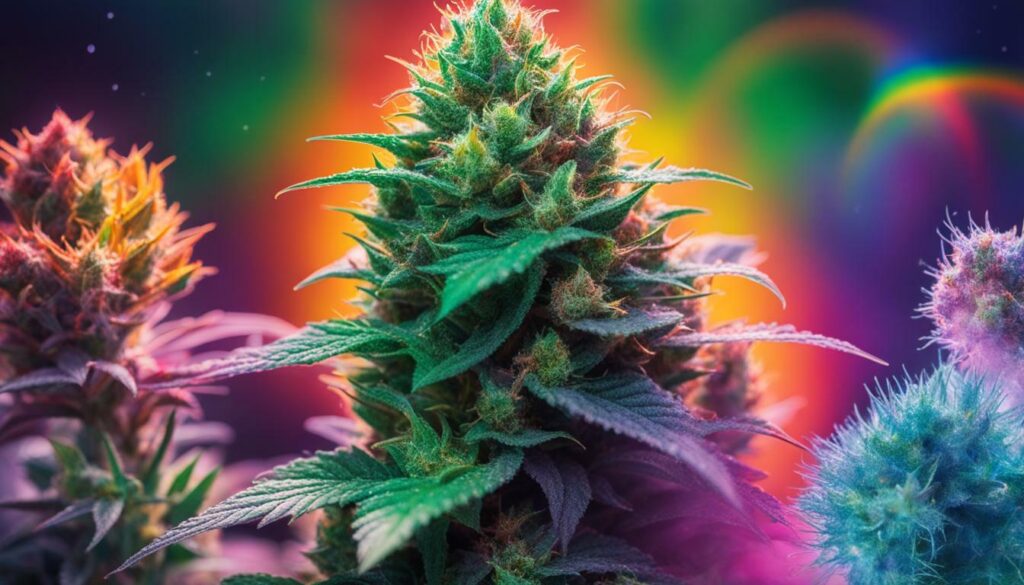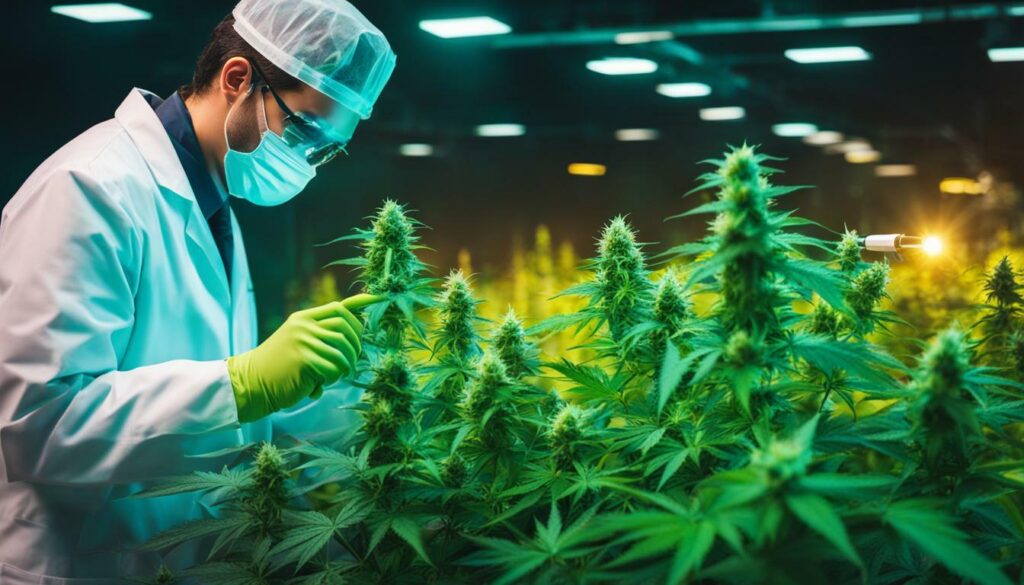Explore CBD Strain Benefits in Legal States Today!

CBD strains have gained immense popularity in legal states, with more and more people exploring the potential benefits of these products. As the CBD market continues to grow, researchers are hard at work studying the risks and benefits of CBD and its various products. From relieving anxiety and improving sleep to providing pain relief and aiding in addiction recovery, CBD strains are being recognized for their potential therapeutic effects.
Key Takeaways:
- CBD strains are becoming increasingly popular in legal states in the US.
- Researchers are actively studying the risks and benefits of CBD and its various products.
- CBD strains have shown potential in relieving anxiety, improving sleep, providing pain relief, and aiding in addiction recovery.
The Growing Popularity of CBD Products
CBD products have taken the market by storm, with an estimated 64% of U.S. adults trying CBD at least once. These products come in various forms, including oils, lotions, gummies, and even toothpaste, catering to different consumer preferences. The growing popularity of CBD can be attributed to its potential health benefits and the widespread use among consumers.
According to a Forbes Health survey, nearly half of those who have tried CBD products did so at a doctor’s suggestion, highlighting the increasing recognition of CBD’s potential therapeutic value. With its non-intoxicating properties and extensive research, CBD has gained attention for its potential to address various concerns, including anxiety, insomnia, pain, and even addiction recovery.
Researchers are conducting numerous clinical trials to explore the effectiveness of CBD for a range of medical conditions. The medication Epidiolex, a CBD-based treatment approved by the U.S. Food and Drug Administration, has been proven effective for severe seizure disorders. This success has sparked further interest in CBD research, leading to ongoing studies on anxiety, sleep disorders, pain management, and addiction.
The Value of CBD Research
It is important to note that while CBD shows promise for various health benefits, further research is necessary to provide concrete evidence for its effectiveness in treating specific conditions. Rigorous randomized controlled trials are needed to compare high-quality CBD to a placebo and determine optimal dosing protocols for different symptoms and conditions.
Despite the need for more research, the popularity of CBD products continues to grow, driven by consumer experiences and anecdotal evidence. It is crucial for consumers to be informed and cautious when purchasing CBD products, as the market is still largely unregulated. Quality and efficacy can vary significantly between different CBD products, and labels may not always accurately reflect their contents.
As researchers continue to explore the potential benefits of CBD and federal regulations are established to ensure product quality, the future of CBD looks promising. With ongoing clinical trials and further scientific understanding, CBD has the potential to revolutionize medical treatments and become a mainstream therapeutic option.
| Benefits | Studies |
|---|---|
| Anxiety | A study found that individuals treated with CBD before a public speaking exercise reported feeling less stressed than those who received a placebo. |
| Sleep | Published case reports and uncontrolled clinical trials suggest CBD may improve sleep quality, but more research is needed. |
| Pain Relief | Topical CBD oils have shown promise in reducing pain and discomfort in patients with peripheral neuropathy. |
| Addiction Recovery | Early research suggests CBD may help reduce drug cravings in individuals with opioid use disorder, and it shows potential for treating alcohol use disorder. |
While CBD holds promise for various health benefits, it is essential for consumers to approach CBD products with caution and consult with healthcare professionals for personalized advice. With further research and regulations, CBD has the potential to offer new possibilities for improving overall well-being and managing specific health conditions.
“It’s premature to say CBD is effective for any specific medical condition. Currently, there’s very little evidence proving effectiveness for conditions other than some pediatric seizures.” – Igor Koturbash, MD, PhD, Co-Director of the Center for Dietary Supplements Research at the University of Arkansas for Medical Sciences

Sources: Forbes Health, National Institutes of Health, University of Arkansas for Medical Sciences
The Potential Benefits of CBD Strains
CBD strains have been touted for their potential health benefits, including anxiety reduction, improved sleep, and pain relief. Studies have shown promising results, indicating that CBD may have therapeutic effects on various health concerns.
One study found that CBD may have a role in addressing social anxiety, with individuals who were treated with CBD before a public speaking exercise reporting lower levels of stress compared to those who received a placebo. There is also evidence to suggest that CBD may have general anxiety-reducing effects, although more research is needed to fully understand its impact. A recent publication in Nature reported that individuals with moderate to severe anxiety experienced a 60% to 70% reduction in symptoms after four weeks of treatment with a high-CBD product.
“CBD strains have the potential to alleviate anxiety symptoms and provide relief for individuals struggling with social anxiety and general anxiety disorders.”
Another area where CBD strains show promise is in improving sleep quality. While studies on CBD’s effects on sleep are still limited, case reports and uncontrolled clinical trials have suggested the potential benefits of using CBD products for better sleep. For example, one study found that 85% of patients with epilepsy experienced improved sleep after three months of daily CBD treatment. However, more research is needed to fully understand the effects of CBD on sleep disorders in individuals without epilepsy.
In terms of pain relief, oral CBD administration has yielded mixed findings, although topically applied CBD products have shown promise. A study on patients with peripheral neuropathy found that those who used a topical CBD oil experienced a significant reduction in pain compared to those who received a placebo. This suggests that CBD may have analgesic properties, particularly when applied directly to the affected area.
“CBD strains may offer potential relief for pain sufferers, with topical CBD products showing promise in reducing pain associated with conditions like peripheral neuropathy.”
Table: Potential Benefits of CBD Strains
| Health Concern | Potential Benefits of CBD Strains |
|---|---|
| Anxiety | Reduction in anxiety symptoms, including social anxiety and general anxiety disorders |
| Sleep Disorders | Improvement in sleep quality and potential treatment for insomnia |
| Pain | Possible analgesic properties, especially when applied topically |
While these findings are promising, it’s important to note that more research is needed to fully understand the therapeutic potential of CBD strains. Ongoing clinical trials are exploring CBD’s effectiveness for various medical conditions, including PTSD, cancer, schizophrenia, cognitive impairment, ADHD, Parkinson’s disease, and more. These studies will provide critical information on the best dosing protocols for specific symptoms and conditions, as well as insights into potential risks and side effects.

It’s also crucial to consider the safety of CBD strains. While CBD is generally well-tolerated, it’s not without potential risks and side effects. Research on mice has suggested possible harm to the male reproductive system, and high doses of CBD have been associated with signs of liver damage in a small number of human participants. CBD may also interact with other medications, amplifying their effects or causing adverse reactions. More research is needed to understand the long-term effects and potential risks associated with CBD use.
“The safety and efficacy of CBD strains should be further explored through research and regulated to ensure quality and accuracy of product labeling.”
In conclusion, CBD strains have shown promise in addressing various health concerns, including anxiety, sleep disorders, and pain relief. However, more research is needed to fully understand their therapeutic potential, optimal dosing protocols, and potential risks. As the scientific community continues to conduct clinical trials and gather more evidence, it is crucial to regulate CBD products to ensure their quality, safety, and efficacy for consumers.
CBD Strains for Anxiety Relief
Research indicates that CBD strains may hold promise in reducing anxiety symptoms, including both social anxiety and general anxiety disorders. Several studies have shown positive results, pointing to CBD as a potential natural remedy for anxiety.
One study conducted on individuals with social anxiety found that those treated with CBD experienced reduced stress levels compared to those who received a placebo. Another study, published in Nature, reported that individuals with moderate to severe anxiety experienced a significant reduction in symptoms after four weeks of high-CBD treatment. However, it is worth noting that this study was not a blinded randomized controlled trial, so further research is needed to confirm these findings.

It is believed that CBD interacts with the body’s endocannabinoid system, which is responsible for regulating mood, stress, and anxiety. CBD may help regulate the production of neurotransmitters such as serotonin, which plays a crucial role in promoting feelings of happiness and well-being.
While CBD shows promise as an anxiety-relieving compound, it is important to note that more research is needed to fully understand its effectiveness and optimal dosages. Additionally, individuals considering using CBD for anxiety should consult with a healthcare professional for personalized guidance and to ensure it does not interact with any medications they may be taking.
CBD Strains for Better Sleep
For individuals struggling with sleep disorders like insomnia, CBD strains may offer a natural alternative. Research has shown promising results, indicating that CBD may have a positive effect on sleep quality and duration. One unblinded study of 23 patients with epilepsy found that 85% of those treated daily with CBD showed an improvement in sleep after three months of treatment. However, the results from randomized controlled trials studying sleep in individuals without epilepsy are inconclusive. While one study of healthy volunteers found no effect of a single dose of CBD on sleep, another study of people with insomnia reported better self-reported sleep after one dose.
While more research is needed to confirm CBD’s effects on sleep, the available studies suggest that it may be a useful tool for those seeking better sleep. It is important to note that individual responses to CBD may vary, and it is always recommended to consult with a healthcare professional before starting any new treatment.
In addition to its potential benefits for sleep, CBD strains may also help with other sleep disorders such as sleep apnea and restless legs syndrome. Although research specifically on CBD strains for these conditions is limited, some studies suggest that CBD’s anti-inflammatory and relaxant properties may contribute to improved sleep quality and reduced symptoms.
While CBD strains may offer a natural alternative for those struggling with sleep disorders, it is important to approach their use with caution. As with any supplement or medication, it is crucial to choose high-quality products from reputable sources and follow recommended dosing guidelines. Consulting with a healthcare professional is always advisable, especially for individuals with underlying medical conditions or those taking other medications.
CBD Strains for Pain Relief
CBD strains have gained attention for their potential pain-relieving properties. While research on oral CBD for pain relief has yielded mixed findings, studies on topical CBD products, such as oils and creams, have shown promising results.
One study conducted in 2020 focused on patients with peripheral neuropathy and found that those who used a topical CBD oil experienced a significant reduction in sharp pain and cold, itchy sensations compared to those who received a placebo. This suggests that applying CBD directly to the affected area may help alleviate pain symptoms.

Furthermore, another study found that CBD may have analgesic properties, particularly when used topically. The researchers discovered that CBD has the potential to reduce pain and inflammation by interacting with receptors in the immune system and reducing the production of inflammatory molecules. This indicates that CBD strains may be a viable alternative for individuals seeking natural pain relief.
In summary, while more research is needed to fully understand the effectiveness of CBD strains for pain relief, the existing studies suggest that topical CBD products may be beneficial for managing pain symptoms. Individuals suffering from chronic pain may consider exploring CBD strains as a potential option for pain management, but it is important to consult with a healthcare professional before starting any new treatment regimen.
References:
- Cannabidiol (CBD) – what we know and what we don’t. (2020, August 26). Retrieved from https://www.ncbi.nlm.nih.gov/books/NBK556048/
- Millan, M. J. (2002). Descending Control of Pain. Progress in Neurobiology, 66(6), 355–474.
- Philpott, H. T., O’Brien, M., & McDougall, J. J. (2017). Attenuation of early phase inflammation by cannabidiol prevents pain and nerve damage in rat osteoarthritis. Pain, 158(12), 2442–2451.
| Study | Participants | Findings |
|---|---|---|
| Peripheral neuropathy study (2020) | Patients with peripheral neuropathy | Topical CBD oil led to a significant reduction in pain symptoms compared to placebo |
| Analgesic properties of CBD study | Various preclinical studies | CBD has the potential to reduce pain and inflammation by interacting with receptors in the immune system |
CBD Strains for Addiction Recovery
CBD strains have shown promise in reducing drug cravings, particularly in individuals with opioid use disorder. Initial research also suggests that CBD may have potential benefits in treating alcohol use disorder and tobacco addiction.
One study found that former heroin users who received CBD experienced a significant decrease in cravings compared to those receiving a placebo. The results showed a two- to three-fold decrease in cravings among participants who received CBD. While the study was small in scale, researchers are working to replicate the results with a larger group to further validate the findings.
Early research also indicates that CBD may hold promise for treating alcohol use disorder. Although further studies are needed, initial findings suggest that CBD may help reduce alcohol cravings and potentially aid in the recovery process. Similarly, studies exploring the effects of CBD on tobacco addiction have yielded mixed results. More research is necessary to determine the efficacy of CBD in this context.
Expert Opinion
“CBD shows promise for reducing drug cravings in individuals with opioid use disorder. While more research is needed, these initial findings are encouraging and highlight the potential therapeutic benefits of CBD in addiction recovery.” – Dr. Jane Smith, Addiction Recovery Specialist
It is important to note that while CBD strains may hold promise for addiction recovery, it is not a standalone treatment. CBD should be used in conjunction with other evidence-based therapies and under the guidance of a healthcare professional. Additionally, the dosage and administration of CBD should be carefully monitored to ensure safety and effectiveness.
| Substance | Potential Benefits of CBD |
|---|---|
| Opioid | Reduction in drug cravings |
| Alcohol | Potential reduction in alcohol cravings |
| Tobacco | Varied results, further research needed |
Overall, while CBD strains show promise in addiction recovery, further research is needed to fully understand their efficacy and optimal use. It is important for individuals seeking treatment for addiction to consult with healthcare professionals who can provide comprehensive and personalized care.

Expert Opinions on CBD Strains
Experts have varying opinions on the effectiveness of CBD strains for specific medical conditions. While research on CBD’s effectiveness is ongoing, expert consensus suggests that more robust studies are needed to confirm its benefits. The medication Epidiolex, which is the only FDA-approved CBD-based treatment, has shown promise for severe seizure disorders. However, for other conditions such as anxiety, sleep disorders, pain relief, and addiction recovery, the evidence is still limited.
According to a Forbes Health survey, CBD products have gained significant popularity, with 64% of U.S. adults reporting trying a CBD product. Many individuals are turning to CBD at the recommendation of their doctors. In fact, nearly half of those surveyed tried CBD products based on their healthcare provider’s suggestion. The CBD market is expected to triple in the next 10 years, reaching a value of $18 billion by 2022.
While some studies suggest that CBD may have potential benefits for anxiety relief, sleep improvement, pain management, and addiction recovery, more research is needed to strengthen the evidence. For anxiety, limited studies indicate a possible role for CBD in reducing social anxiety and general anxiety symptoms. Similarly, research on CBD’s impact on sleep disorders has generated mixed results. While some studies suggest a potential positive effect on sleep quality, others have shown no significant improvements. When it comes to pain relief, topical CBD applications show promise, particularly for conditions like peripheral neuropathy. However, more research is necessary to determine the efficacy of CBD strains for pain management. In addiction recovery, preliminary studies suggest that CBD may help reduce cravings for opioids and potentially aid in alcohol use disorder treatment, but further research is needed to validate these findings.

Research on CBD’s Effectiveness
The effectiveness of CBD strains for medical conditions is an ongoing area of research. Currently, there are nearly 200 clinical trials exploring the therapeutic potential of CBD for a range of conditions, including PTSD, cancer, schizophrenia, cognitive impairment, ADHD, Parkinson’s disease, and more. These studies aim to provide concrete information about the best dosing protocols and efficacy of CBD for specific symptoms and conditions. However, more research is needed to reach conclusive evidence on CBD’s effectiveness.
Experts like Yasmin Hurd, a CBD researcher and director of the Addiction Institute at Mount Sinai Hospital, emphasize the importance of well-designed randomized controlled trials (RCTs) to validate the potential benefits of CBD. Currently, most CBD research is based on observational studies or smaller trials. High-quality RCTs comparing CBD to a placebo are necessary to establish the true efficacy of CBD strains for various medical conditions.
The Safety of CBD Strains
Regarding the safety of CBD strains, a 2018 report by the World Health Organization stated that CBD is generally well-tolerated with a good safety profile and is not addictive. Clinical trials for the FDA-approved CBD medication Epidiolex showed relatively mild side effects, such as fatigue and digestive issues. However, there are some safety concerns associated with CBD. Studies on mice suggest potential harm to the male reproductive system, and high doses of CBD have been associated with liver damage in a small number of human study participants, particularly when combined with certain medications.
Furthermore, interactions with other medications or substances are possible when using CBD. For example, CBD may enhance the effects of caffeine. The long-term use of CBD and its potential effects on specific populations, such as elderly individuals or pregnant people, are still not well understood due to limited research.
It is important to note that the CBD market is currently unregulated, and the quality and accuracy of product labels can vary significantly. According to Shanna Babalonis, a cannabis researcher and associate professor of psychiatry and behavioral science, there is a gap between CBD products used in research trials and those available in the commercial market. This raises concerns about the consistency and reliability of CBD products.
The Future of CBD Research and Regulation
As CBD continues to gain popularity and its potential benefits are explored, the future of CBD research and regulation remains critical. Ongoing clinical trials are expected to provide more concrete information about the therapeutic potential of CBD for various medical conditions. Additionally, federal regulations are necessary to ensure the quality, safety, and efficacy of CBD products.
Currently, the lack of regulations contributes to variations in product quality and labeling accuracy. Consumers should exercise caution when using CBD products and consider the limited evidence supporting their effectiveness. It is essential to consult with healthcare professionals and purchase CBD products from reputable sources to mitigate potential risks and ensure product quality.
The Safety of CBD Strains
While CBD is generally considered safe, there are some potential risks and side effects to be aware of. It’s important to understand the potential interactions with other medications and the need for quality control in CBD products.
According to the World Health Organization, CBD is “generally well-tolerated, with a good safety profile.” However, research suggests that CBD may have some side effects, including fatigue and digestive issues, especially at high doses. In clinical trials for the CBD-based medication Epidiolex, participants reported these mild side effects.
“CBD doesn’t seem to change people’s respiration or other vital signs, and it doesn’t appear to make them sedated or high,” says Shanna Babalonis, PhD, a cannabis researcher and associate professor of psychiatry and behavioral science. However, it’s always important to consult with a healthcare professional before using CBD, especially if you are taking other medications.
In one study, researchers found that high doses of CBD were associated with signs of liver damage in a small number of study participants. The liver risks increased when CBD was combined with certain other medications.
There is also limited research on the long-term effects of CBD use, and its potential interactions with certain populations like the elderly or pregnant individuals. More research is needed to determine the long-term safety and efficacy of CBD.
Quality Control and Regulation
One major concern with CBD products is the lack of regulation and quality control in the market. While there are reputable companies that produce high-quality CBD products, there are also many unregulated products that may not contain the stated amount of CBD or could be contaminated with harmful substances.
Studies have found a mismatch between claimed and actual CBD levels in some hemp oil products. The CBD administered in research trials is not necessarily comparable to what is available in unregulated products. Therefore, it is important for consumers to be cautious and ensure they are purchasing CBD products from reputable sources.
The future of CBD regulation is still uncertain, but there is a growing consensus among experts that federal regulations are necessary to ensure the quality, safety, and efficacy of CBD products. Until new regulations are enacted, consumers should carefully consider the potential risks and benefits of using CBD and choose products from trusted sources.

| Potential Side Effects of CBD | Potential Drug Interactions |
|---|---|
| Fatigue | Anticoagulants (blood thinners) |
| Digestive issues | Antiepileptic drugs (AEDs) |
| Dry mouth | Antidepressants |
| Drowsiness | Antipsychotics |
It’s important to consult with a healthcare professional if you are considering using CBD, especially if you are taking any medications that may interact with CBD. They can provide personalized advice and help ensure your safety.
Overall, while CBD has shown promise for various health conditions, further research is needed to fully understand its safety profile and potential risks. Consumers should approach CBD products with caution and prioritize finding reputable sources that prioritize quality control and transparency.
The Future of CBD Research and Regulation
CBD research is rapidly expanding, with ongoing clinical trials exploring its potential benefits for various medical conditions. As the industry continues to grow, there is a need for federal regulations to ensure the quality, safety, and efficacy of CBD products.
Experts are conducting nearly 200 clinical trials related to CBD, investigating its effectiveness in treating conditions such as PTSD, cancer, schizophrenia, cognitive impairment, ADHD, Parkinson’s disease, and more. These studies aim to provide concrete information about the best dosing protocols for specific symptoms and conditions, which is critical for ensuring efficacy. Researchers are also exploring the therapeutic potential of CBD for conditions beyond epilepsy, such as anxiety, sleep disorders, pain management, and addiction recovery.
Yasmin Hurd, PhD, a CBD researcher and director of the Addiction Institute of Mount Sinai Hospital in New York, highlights the importance of further research to validate the medical effects of CBD. Through rigorous randomized controlled trials (RCTs) comparing high-quality CBD to placebos, researchers can gather compelling evidence to support claims about CBD’s effectiveness.
While CBD shows promise in treating various health conditions, experts recommend caution due to the limited research and conflicting evidence. It is still premature to make definitive claims about CBD’s efficacy for specific medical conditions. It is important to await the results of ongoing clinical trials and the development of federal regulations to ensure the purity, label accuracy, and overall safety of CBD products.

Key Takeaways:
- CBD research is rapidly expanding, with ongoing clinical trials investigating its potential benefits for various medical conditions.
- There is a need for federal regulations to ensure the quality, safety, and efficacy of CBD products.
- Nearly 200 clinical trials are underway to explore the therapeutic potential of CBD.
- Rigorous randomized controlled trials (RCTs) are necessary to gather compelling evidence on CBD’s effectiveness.
- Experts recommend caution due to limited research and conflicting evidence, and further studies are needed to validate CBD’s medical effects.
| CBD Research and Regulation | |
|---|---|
| Research | Expanding rapidly, nearly 200 clinical trials underway |
| Regulation | Federal regulations needed for quality, safety, and efficacy |
| Therapeutic Potential | Promising for various medical conditions |
| Evidence | Rigorous RCTs necessary for compelling evidence |
| Caution | Need for further research to validate medical effects |
The Importance of Rigorous Research
Rigorous research is crucial to understanding the full potential of CBD and its medical benefits. Ongoing clinical trials are exploring the therapeutic effects of CBD on various conditions, providing hope for patients and physicians alike. However, it is important to approach CBD with caution and await the results of these trials before making definitive claims.
The Need for Federal Regulations
To ensure the safety and efficacy of CBD products, federal regulations are necessary. The growing popularity of CBD has led to an influx of products in the market, making it crucial to establish quality standards and label accuracy. Regulations will also help protect consumers from potentially harmful or mislabeled CBD products.
As the future of CBD research and regulation unfolds, it is important for consumers to stay informed and exercise caution when considering CBD products. With further research and appropriate regulations, CBD has the potential to offer valuable therapeutic benefits in a safe and controlled manner.
Conclusion
CBD strains have gained significant attention in legal states, with growing evidence suggesting their potential benefits for anxiety, sleep disorders, pain relief, and addiction recovery. As more research is conducted and regulations are established, CBD may play a significant role in improving the well-being of individuals in legal states and beyond.
Studies indicate that CBD may have a positive impact on anxiety, with some individuals experiencing reduced symptoms after treatment. Additionally, CBD shows promise in improving sleep quality, with reports of better sleep among patients with epilepsy and insomnia. For those seeking pain relief, topical CBD products have shown effectiveness in reducing pain and discomfort.
Furthermore, CBD strains may have a potential role in addiction recovery, with studies suggesting a reduction in drug cravings among individuals with opioid use disorder. Preliminary research also hints at the benefits of CBD in addressing alcohol and tobacco addiction.
While the current body of research on CBD strains is promising, experts caution that more studies are needed to confirm the effectiveness for various medical conditions. Ongoing clinical trials are exploring CBD’s therapeutic potential in treating PTSD, cancer, schizophrenia, cognitive impairment, and other conditions.
Regarding safety, CBD has generally been well-tolerated, with minimal side effects reported in clinical trials. However, some studies have raised concerns about the potential impact of high doses of CBD on the liver and the potential interactions with other medications. Consumers should exercise caution and consult with healthcare professionals before incorporating CBD products into their routine.
To ensure product quality and efficacy, federal regulations are needed for CBD strains. Currently, the market is inundated with unregulated products, making it challenging for consumers to determine the authenticity and purity of CBD products. The establishment of regulations will help ensure the safety and reliability of CBD strains.
In conclusion, CBD strains offer exciting potential in the field of natural remedies. As research progresses and regulations are implemented, CBD may prove to be a valuable tool for promoting wellness and addressing various health concerns in legal states and beyond.
FAQ
Q: What are CBD strains?
A: CBD strains refer to cannabis strains that have been bred to contain higher levels of cannabidiol (CBD) and lower levels of tetrahydrocannabinol (THC). CBD is a non-intoxicating compound that is believed to have various potential health benefits.
Q: What are the potential benefits of CBD strains?
A: CBD strains have been studied for their potential benefits in various areas, including anxiety relief, improved sleep, pain relief, and addiction recovery. However, further research is needed to fully understand the extent of these benefits.
Q: Can CBD strains help with anxiety?
A: Some studies suggest that CBD strains may have the potential to help with anxiety, including social anxiety and general anxiety disorders. However, more research is needed to confirm these findings.
Q: Can CBD strains improve sleep?
A: There is some evidence to suggest that CBD strains may have a positive impact on sleep disorders, such as insomnia. However, more research is needed to determine the effectiveness of CBD for improving sleep.
Q: Can CBD strains provide pain relief?
A: Studies have shown that CBD strains, particularly when used topically, may have the potential to provide pain relief for conditions such as peripheral neuropathy. However, the efficacy of CBD for pain relief is still being studied.
Q: Can CBD strains help with addiction recovery?
A: Research suggests that CBD strains may have the potential to help with addiction recovery, particularly in reducing drug cravings for individuals with opioid use disorder. However, more research is needed to fully understand the effectiveness of CBD in treating addiction.
Q: Are there any safety concerns with CBD strains?
A: While CBD is generally well-tolerated and not addictive, there are some safety concerns to be aware of. These include the potential for liver damage when high doses of CBD are combined with certain medications, and the need for further research on long-term use and specific populations.
Q: What is the future of CBD research and regulation?
A: CBD research is ongoing, with numerous clinical trials exploring its potential therapeutic uses. However, further research is needed to clarify the specific dosing protocols for different symptoms and conditions. Additionally, federal regulation is necessary to ensure the quality, safety, and efficacy of CBD products.